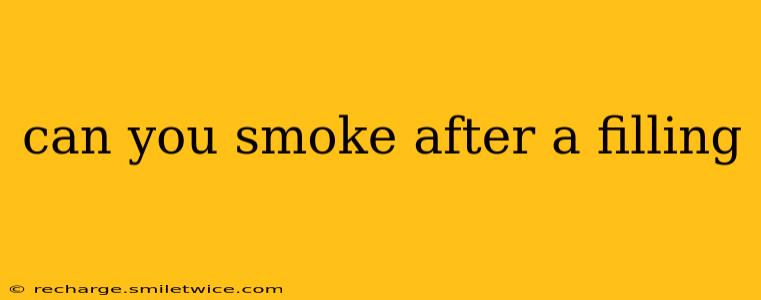Getting a dental filling is a common procedure, but recovering properly is crucial for its longevity and your overall oral health. Many patients wonder about the impact of smoking on their recovery, especially whether they can smoke after a filling. The short answer is: no, you should avoid smoking after a filling, ideally for at least 24 hours, and preferably longer. Let's delve deeper into why.
Why Should I Avoid Smoking After a Filling?
Smoking significantly hinders the healing process after a filling for several reasons:
-
Impeded Healing: Smoking restricts blood flow. This reduced blood flow means less oxygen and nutrients reach the area where the filling was placed, slowing down the healing process and increasing the risk of complications. Your body needs ample blood supply to properly integrate the filling material with your natural tooth structure.
-
Increased Infection Risk: Smoking weakens your immune system, making you more susceptible to infections. An open wound, even a tiny one from the filling procedure, is more vulnerable to infection if your immune response is compromised by smoking.
-
Delayed Bonding: The filling material needs time to bond securely with your tooth. Smoking can interfere with this bonding process, potentially leading to the filling loosening or falling out prematurely. This means you might need further dental work sooner than expected.
-
Dry Socket Risk (for extractions): While this question focuses on fillings, it's important to note that if you've also had an extraction before the filling, smoking significantly increases your risk of developing a dry socket—a painful condition where the blood clot protecting the extraction site is dislodged.
How Long Should I Wait Before Smoking After a Filling?
While some sources might suggest waiting a few hours, it's best to avoid smoking for at least 24 hours after receiving a filling. This allows the initial healing to begin and reduces the risk of complications. Ideally, you should refrain from smoking for several days to allow for optimal healing and bonding. The longer you abstain, the better.
What Happens if I Smoke After a Filling?
Smoking immediately after a filling can lead to several negative consequences:
- Pain and discomfort: The reduced blood flow can result in increased pain and sensitivity in the treated tooth.
- Loose or dislodged filling: The impaired bonding process might cause the filling to become loose or even fall out, requiring further dental intervention.
- Infection: An increased risk of infection can lead to more serious complications requiring antibiotics or further dental procedures.
Can I Smoke While the Filling is Curing?
The "curing" process refers to the setting time of the filling material. While the material is setting, the harmful effects of smoking are the same as described above. Avoiding smoking during the curing process is equally crucial as avoiding it after. The material needs an undisturbed environment to bond effectively.
What Alternatives Can I Use Instead of Smoking After a Filling?
If you're a smoker and have a filling, try to use this as an opportunity to explore strategies to quit or reduce your smoking habits. Consider nicotine replacement therapy (NRT), counseling, or support groups. Your dentist or doctor can provide guidance and resources to help you quit smoking permanently, which will benefit your overall health and dental well-being.
By carefully following your dentist's instructions and avoiding smoking after a filling, you can significantly increase the chances of a successful procedure and a healthy, long-lasting restoration. Remember, prioritizing your oral health is crucial for your overall well-being.
